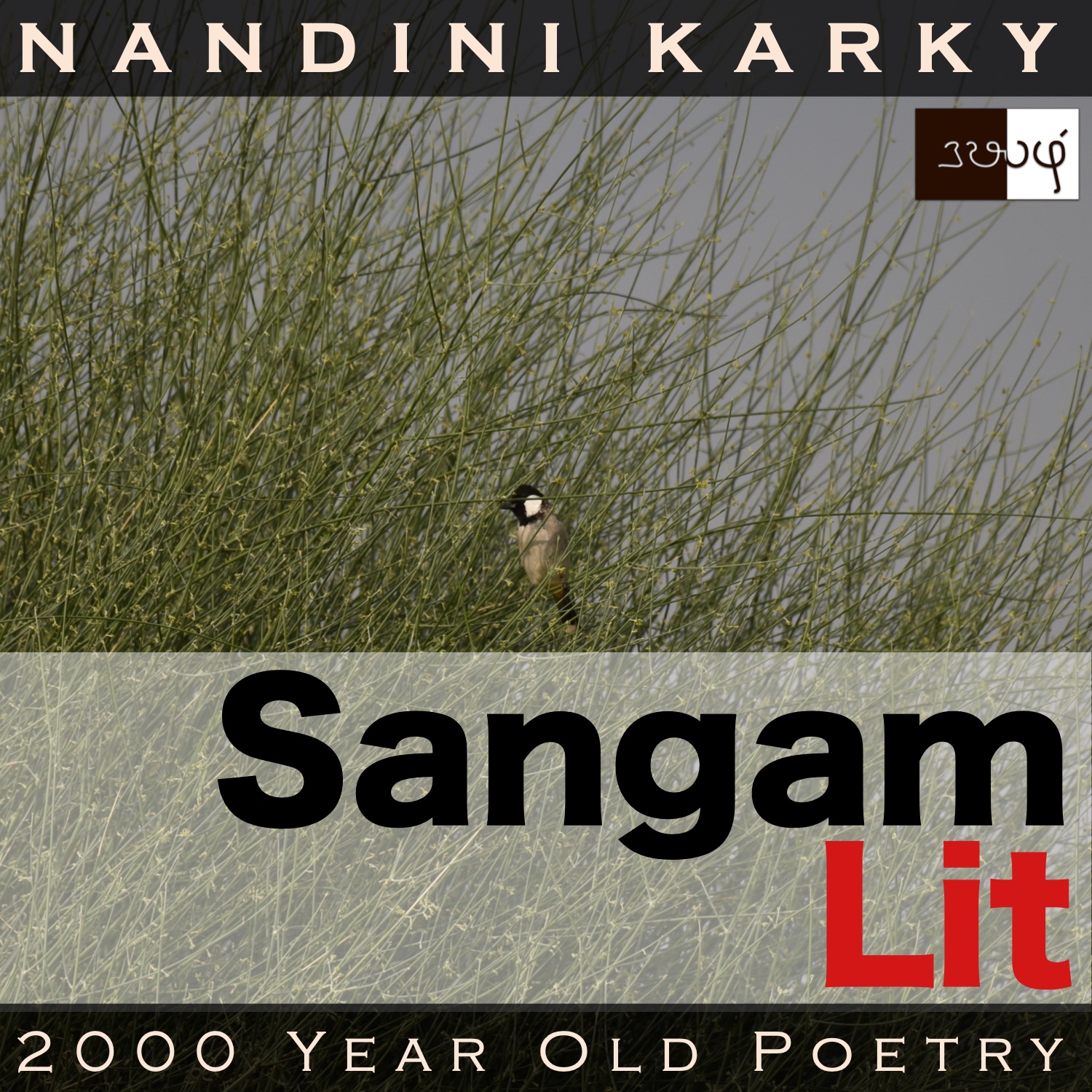Podcast: Play in new window | Download
Subscribe: Apple Podcasts | Spotify | Amazon Music | Android | iHeartRadio | TuneIn | RSS | More

In this episode, we perceive the struggle between seeking wealth and being with a beloved, as portrayed in Sangam Literary work, Natrinai 366, penned by Madurai Eelathu Poothan Thevanaar. The verse is situated in the drylands of ‘Paalai’ and speaks in the voice of the man to his heart, conveying his decision not to part away from the lady.
அரவுக் கிளர்ந்தன்ன விரவுறு பல் காழ்
வீடுறு நுண் துகில் ஊடு வந்து இமைக்கும்
திருந்துஇழை அல்குல், பெருந் தோட் குறுமகள்
மணி ஏர் ஐம்பால் மாசு அறக் கழீஇ,
கூதிர் முல்லைக் குறுங் கால் அலரி
மாதர் வண்டொடு சுரும்பு பட முடித்த
இரும் பல் மெல் அணை ஒழிய, கரும்பின்
வேல் போல் வெண் முகை விரியத் தீண்டி,
முதுக் குறைக் குரீஇ முயன்று செய் குடம்பை
மூங்கில்அம் கழைத் தூங்க, ஒற்றும்
வட புல வாடைக்குப் பிரிவோர்
மடவர் வாழி, இவ் உலகத்தானே!
Opening with the words ‘அரவுக் கிளர்ந்தன்ன’ meaning ‘akin to a snake that raises its head’, the verse presents an image of a cobra raising its hood. ‘நுண் துகில்’ talks about the kind of cloth worn by the ancients, for it means ‘delicate and fine fabric’, probably a light and transparent material. The oft-repeated phrase ‘மணி ஏர் ஐம்பால்’ meaning ‘a sapphire-like, five-layered tresses’ highlight the thick texture of women’s hair and how it was a favoured indicator of youth and beauty then. In the words ‘கூதிர் முல்லை’, the flower and the season have been intertwined for it means ‘wild jasmine of the cold season’. ‘கரும்பின் வேல் போல் வெண் முகை’ meaning ‘the spear-like, white flowers of the sugarcane’ bring to fore, a part of the plant not known to many. Let’s delve into this, a little more, in a while. ‘முதுக் குறைக் குரீஇ’ talks about ‘a bird that foresees its future’ and brings to fore, the instinctual abilities of birds, which seem to know when to do what, be it flying enormous distances or preparing to nest where they live. There’s so much substance in the words ‘முயன்று செய் குடம்பை’ for it means ‘a nest built with effort’ and signifies the hard work of a bird, which, little though it may be, gathers the resources to construct its home. Thereafter, there is mention of ‘வட புல வாடை’ meaning ‘the cold winds from north’ which are called the ‘north-easterly winds’ in current-day weather terminology. The verse ends with ‘பிரிவோர் மடவர், வாழி, இவ் உலகத்தானே’, meaning ‘those who part away are the foolish lot of this world’ and nudges us to explore more!
The man and lady had been leading a happy, married life when the man felt compelled by his heart to go in search of wealth. The man turns to his heart and says, “Akin to a cobra’s raised hood, her bejewelled loins twinkle, as the delicate fabric of her attire sways, surrounded by a string of many, mixed gems. The sapphire-like tresses, worn in five layers, belonging to the lady with thick shoulders have been washed fresh, leaving it without a speck of dirt, and short-stemmed flowers of the wild jasmine, which blooms in this cold season, have been tied, making male bees swarm around in the company of their beautiful females. Pushing the sugarcane’s spear-like, white flowers to bloom, and swaying that nest built with much effort by a thoughtful bird on the beautiful stalks of the bamboo, the cold, northern winds blow and attack. Leaving behind the dark and soft comfort of a lady’s tresses, those who part away during the time of these winds, are the fools of this world!” With these words, the man conveys to his heart his refusal to yield to its demand to leave in search of wealth, citing the inappropriateness of the season.
Now, for the details! The man glorifies the lady’s beauty by talking about the various facets of her youthful appearance, and ends with the crowning glory of her tresses, which he describes as shining like sapphires and so thick so as to be tied in five layers. He finishes this ecstatic description by saying that those tresses are comforting akin to a bed. Then, he turns his attention to the northern winds and describes how these winds make the sugarcane’s flowers bloom and the bird’s hard-built nest on the bamboo stalks to sway precariously. Sugarcane, I have relished many a time, and even seen the stalks of this plant in fields but I was not aware that they flowered. Searching for images, I found white flowers standing high above the plants, much like the spears mentioned as a simile here. When reading more about it, I understood the reason for not having seen these flowers commonly. The flowers are said to be a disadvantage to sugarcane growers, for it reduces the sucrose content of the crop. So, our savvy agriculturists have made sure they claim the crop before the flowering takes place. I suspect that this is age-old knowledge, for there is a hidden meaning in this verse that the northern winds make these sugarcane flowers bloom and thereby, waste the potential of the crop.
The attack of the northern winds on the sugarcane and the bird nest go on to signify how the lady will too will be attacked by pining in the man’s absence, especially in the nights when these cold winds blow. That’s why the man ends by saying those who thinking of leaving that soft comfort of the lady’s tresses and intend to part away when these winds blow, are to be considered the most foolish of all! As we savour the rich taste of sugarcane and see the focused efforts of a bird building its nest in the lines of the verse, we understand how the vast knowledge about the natural world the ancients possessed is woven as fine threads in this verbal fabric of relationships!




Share your thoughts...